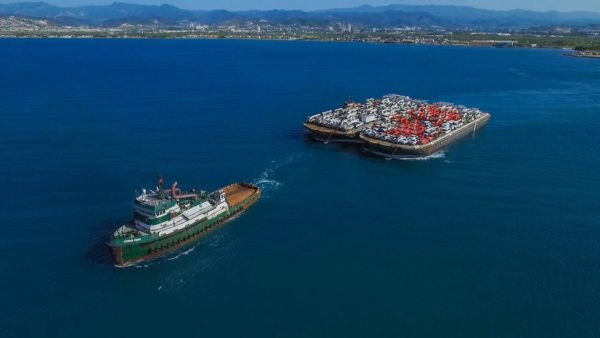Disaster Relief Experience Means Foss is Well Positioned to Help if Hurricanes Strike Again
With extensive experience in disaster response in the last few years, and with the 2018 hurricane season underway, Foss is ready to swing into action once again and assist the government with relief efforts in hard-hit areas.
“We are continuing to position ourselves as a valued supplier for any future contingency,” said John Tirpak, vice president for business development and contract services.

The Corbin Foss departed from Puerto Rico last March towing two barges loaded with utility trucks that were used to restore power to the Island.
Most recently through contracts with the Federal Emergency Management Agency, its suppliers and the Army Corps of Engineers, Foss was heavily involved in the relief effort following Hurricanes Maria and Irma, which battered Puerto Rico and the U.S. Virgin Islands last year.
Services included providing 900 beds and full hotel services for relief workers, delivering multiple barge loads of food and water, and transporting nearly 600 utility trucks to and from Puerto Rico to help restore its electric power.
In 2010 Foss supported the earthquake relief in Haiti through government and private contracts. The company moved 90,000 tons of food, many barge loads of military support equipment, did salvage work and established a port structure with Foss-leased barges.
In 2012, Foss joined forces with the U.S. Defense Logistics Agency to help following Hurricane Sandy, which wreaked havoc in the northeastern United States. The DLA awarded Foss a flag as recognition for the company’s high-level performance.
“Experience is important because although one never knows when a natural disaster will occur, they do occur,” said Tirpak noting that the work is rewarding from a humanitarian standpoint and shows Foss’ skill set to the government. “Our past experience reflects Foss’s ability to respond quickly and safely to support disaster relief efforts.”
Tirpak explained that the company’s tug and barge fleet can respond quickly to offshore areas where infrastructure is impaired. The company can land in areas with portable ramps to discharge rolling stock and containers.
Also an asset is Foss’ alliance with other third-party providers and its colaboration with other transportation companies owned by its parent, Saltchuk. Saltchuk’s many assets include steamship operations in the Caribbean and in the north Pacific, areas where Foss also has the highest response capabilities.
“The other significant capability we have is the on-ground support we bring with project managers who have experience with many contingency operations,” Tirpak said. “Many of them are certified Project Managers and are accustomed to solving operational challenges in remote areas with little infrastructure.”
In Tirpak’s view, disaster relief is much improved since Hurricane Katrina struck the Gulf Coast in 2005.
“The various response agencies have become much more coordinated in this stressful environment,” Tirpak said. “They have used the lessons learned through the crises over time to become much more coordinated than reactionary.”
